.
.
“Blue in Green” (Miles Davis)/© Paul Lovering
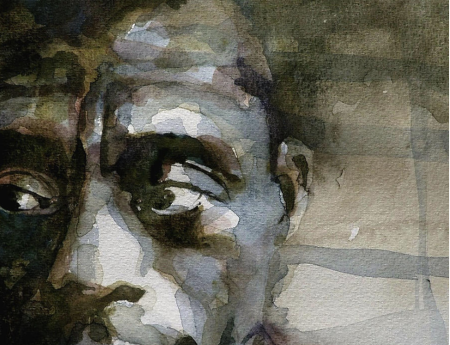
.
“Blue in Green” is by Paul Lovering, an English-born artist who specializes in portraits that often blend painting and photography of famous figures.
Paul has graciously consented to have a sampling of his work published within this collection of jazz poetry. To view more, please pay a visit to his website by clicking here. A more complete biography can be found on the artist and poet biography page, which can be viewed by clicking here.
.
.
_____
.
.
Dear Readers:
…..In this, the 17th major collection of jazz poetry published on Jerry Jazz Musician, 50 poets from all over the world again demonstrate the ongoing influence the music and its associated culture has on their creative lives.
…..That these collections have become a unique and popular part of the fabric of the jazz world is a major source of pride for me, and a testament to the inspiration writers receive from their complex relationship with this extraordinary music.
…..As always, thanks to the poets, and I hope you enjoy.
.
Joe Maita
Editor/Publisher
.
.
___
.
.
At the conclusion of the poems, biographies of the artist and poets contributing to this collection are listed in alphabetical order
.
A selection of jazz recordings are available to listen to throughout the collection.
.
.
___
.
.
“Clifford Brown”/© Paul Lovering
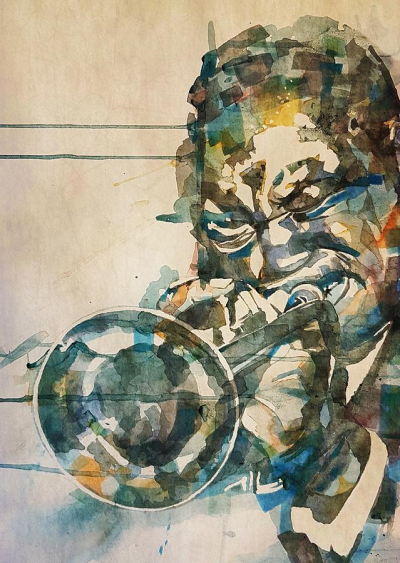
.
.
Tell Me About Jazz
I want to know everything
everything you know
take me home to mother land
the warm sound of hollow reed
bump bump of the wooden stick
cracked upon these holy stones
that cry out the truth of prophesy
bend the bow to find the note
the hunter knows which way to point
teach me how to dance in circles
to celebrate the spinning planet
to shake and improvise my love
I will hold the rhythm in my heart
the harmony will be my voice
our combination provides the choice
together we shall sing and blow
so your confession becomes my truth
when you tell me
everything you know
.
by Joe Kidd
.
___
.
Interested In Poetry & Jazz
I never tire of being fired by inspiration;
Aided, guided by the source town-crier
Higher than it all.
Interested in poetry & jazz,
Two esoteric subjects as
Important as atomic science.
Lions in artistic science.
All it needs to train
Is will and brain.
So don’t ignore them,
Don’t rush by them:
Try them.
Take a whiff.
The rhyme, the riff.
Each genre gem –
The pulp f life.
Poetry and jazz: two wondrous essences
For transference and furtherance.
Poetry: life’s symmetry.
Jazz: life’s glaze.
Each a phrase in praise of life.
Ablaze in every phase of life.
.
by Arlene Corwin
.
___
.
What Makes It Jazz Poetry?
…………….(for Ree Dragonette with Eric Dolphy)
My tenor saxist
has his doubts that tune
“Good Man is Hard to Find”
quite right, the blues to use
with my poem “Copyright.”
True, any blues would do,
or any song not wrong.
I explain that even though
it’s fine when band
completes tune form behind me reading,
when those words run out,
I dig it most when
poem ’n melody together come,
eliminating middle man
to pleasure soar
on purely music plane.
It’s exquisite tension
outercourse, intercourse
deep vibration energy decelerates
to matter splatter
floating words on music
take it out
no matter what
him first? me first?
no matter, matter of fact.
Process
does and does not matter
making just our coupling
of printed matter
in the moment
music doubling that
matter of course
creates
jazz poetry.
Try jazz poet — try
.
by Catherine Lee
.
___
.
Who You Are: Jazz On The Canvas
…..“Jazz? He thought it was the only other
really creative thing happening…” -Lee Krasner,
regarding her husband Jackson Pollock
Not random
Progressive, experimental
No end and no beginning
The intersection of art
And jazz: self-discovery
You create what you are
Handprints, footprints
His body itself on the canvas
Untethered, fully expressive
His nights in the Bowery
At the Five Spot: Ornette Coleman
And Boff Boff (Mop Mop)
Billie Holiday dripping honey
At the mic: “I got a man crazy for me,
he’s funny that way…”
Swinging, revolutionary
Black lines and white lines;
Thickening and thinning
Flicking colors of sound:
Splashed! Dripped! Splattered!
Jazz in the methodologies
Ornette saw the signs and signals
In his work: “like a letter he’s writing
In the form of art”
Open to interpretation! Swing and bebop,
The blues of fluid musicality; the energy
Of jazz on the canvas
Slammed as “Jack the Dripper”
Mocked and demoralized; ahead of his time!
Art as free jazz and booze-fueled fist fights
Genius delivered; art as self-discovery
No need to explain the unexplainable, Jackson
Theorizes: “every good artist paints who he is”
.
By Connie Johnson
.
___
.
Noises Of New York
………….After Bob Kaufman
NYC, land of business and art,
hip hop and jazz in the streets,
hair buzzing, subway roars,
odors, poets in Gowanus,
reading poetry to one another,
self-published, declamatory:
full of anger and joy.
Poetry happens in basements,
barrooms, backrooms,
by typing free verse
on laptops and phones.
At international Poetry Day,
there’s an eastern European
bard, an East Village lesbian,
a Walloon, and me in the
audience absorbing them
like a Bounty roll. The last
one riffs on hyenas,
after a Scotsman, then reads
lyrical. New York City,
too many condo conversions,
a laureate gets priced out
of Queens, moves upstate.
I head south of the border.
An outro
like a Count Basie ending.
.
by Geer Austin
.
.
Listen to the 1959 recording of Ornette Coleman performing his composition “Lonely Woman,” with Ornette (alto saxophone); Don Cherry (cornet); Charlie Haden (bass); and Billy Higgins (drums) [Rhino/Atlantic]
.
.
An Episode In The Glory Of Sound
Duke’s lone piano presents the Mockingbird’s call
commanding sweetly a Sunset song
with that orchestra the surrounding Earth
shifting solos rising from the depth of geology
making an atmosphere beautiful for continued breath
and the petal’s fragrance of a single rose
.
by Terrance Underwood
.
___
.
He Knows
in the corner
his shadow,
faded within
half lights
where he
speaks out
summoning
the spirits
crying out
dog wild
about demons
running with
failed promises
like a rattlesnake
night train
kicking up
the sound of
fluid jazz
making stones
weep
,
by Roger Singer
.
___
.
Harmolodics
…………Listening to Ornette Coleman
“Harmolodics,” Coleman called it,
an enticing term that led
to confusion and shaking heads.
Briefly put, the word describes,
to some, an aversion
to the inversion of chords.
Do I make sense?
Are my words diminished,
augmented, major or minor?
Can I play C in the tonic?
or in a major seventh
with an upward resolution?
Doesn’t the melody dictate?
I’m confused; not even close.
“Ornette! Man, you pullin’ my leg?”
.
by Russell duPont
.
___
.
Kansas City
I’m listening to Ronnie Earl’s
blues tune “Kansas City
Monarch”
and think it could be like a
Kerouac hitchhiking poem—
Its crisp notes against dazzling piano
strokes, a wind upon a post war street,
and those echoing chords—
nights on the cold ground under
the fog in a flannel sleeping bag.
But it’s also sad, the blues, endless
avenues in cities of a nation littered
w/ commands “thou shalt!” and
“hurry up!”
the paper swirling into stairwells
filled w/ needles, condoms, &
lament.
No direction to go—
but inwards, to the
center upon which all our sentiments
spin—
that yellow brick road of three cord
progression, Dorthy’s Kansas,
where a massive tornado
reveals everything . . . .
Yet, the cleanliness of Kansas City
in the middle of a country smelling of
laundry detergent lined with measured
haircuts
and pony tailed dames bouncing by—
Is sadness celebrated, openness
vaulted, dharma bums
undaunted—just two lonesome
travelers sipping Tokay—
Kerouac in Kansas, Ronnie Earl with him too!
.
by DH Jenkins
.
___
.
Playing Sonny Rollins Loud In The Car
Hurrying to a dental appointment
I didn’t want to go to in the first place
an interminable red light and honking traffic
and the curve where people merge
20 MPH faster than necessary
four lanes into two
not a good day overall
though Sonny Rollins is playing loud;
“St. Thomas” warm balmy street carnival dance
and the loping jagged dissection of “Now’s The Time”,
at the damn light that won’t change
and a guy, a Poughkeepsie down home boy
grown older and looking a little tired around the edges
walking by turns on the sidewalk grins a bright sunny smile
and gives me a big thumbs up
and I smile back and wave as the light changes
and I travel on thinking now is that time that
is only right now and hip shaking sunshine caribbean breezes
rolling by are an antidote to numbness of novocaine
and traffic that snarls and grinds,
simply because somebody,
a stranger noticed beauty and cared.
.
by Daniel W. Brown
.
.
“I Wish I Knew How It Would Feel To Be Free” (Nina Simone)/© Paul Lovering

.
.
Ella Swings It
Ella swings it
Ella brings it
Home to you and back again
Ella scats it
Come on cats it’s
Jiving time so jump right in
Ella knows it
Ella shows it
Everybody’s got to hear
When she shouts it
No one doubts it
All your woes will disappear
In a fur coat and a great big hat
She reels them notes off rat-a-tat-tat
Joins them together like a chain-link fence
They got no lyrics but they just make sense
Ella’s got it
Now you’ve caught it
This scat-song fever that’s got no cure
Won’t go away now
It’s here to stay now
It’s in your blood you can be sure
So let it take you
And let it make you
A bird with shining silver wings
There’s no denyin’
That you’ll be flyin’
Whenever Ella, Ella swings
.
by Thomas R. Keith
.
___
.
Bette Midler Sings
In the Continental Baths she sings
like she means it
like she’s the one
who lives it
Any day now
I shall be released
With passion she repeats it
any day now …any day now …I shall be released
sings for every culture
every generation
For all those women
who beat against the walls
built by men who have no self-esteem
unless they alone have it all
For women in every country
from west to east
where men think they’re not real men
unless their women are in chains
For all those women trying
to convince themselves, she sings
any day now …any old day now
points her finger, beats her breast
Flings her arms into the air
any day now… any day …now
I am going to be ………..released
.
by Phyllis Wax
.
___
.
Another Pretty Face
I had no talent,
All I had was looks
Said Lena
24 films later
53 albums later
Stormy Weather
Till the Clouds Roll By
Good Witch Glenda from The Wiz
A Tony, an honorary doctorate, a star on the Hollywood Walk of Fame
A few rides with the Tuskeegee Airmen
Some work with Eleanor Roosevelt to pass anti-lynching laws
Rally with Medgar Evers then March on Washington
Refuse to appear in segregated venues: no how, no way, full stop
What an ungifted, incompetent bimbo
.
by Allison Whittenberg
.
___
.
Eunice
Ask six different people
What kind of music she played,
You get six different answers…
But no one ever asked
Is that Nina? Cause if you
Didn’t know,
Had to ask,
Then you didn’t know…
So many stories—
People want to talk about
The crazies
The outbursts
The medication
But reeeally?
The woman’s private life
Is just that…
But the woman’s music
Is for the generations,
From the soul
to the whole world…
Her voice—
So angry, tender
Raw, sophisticated
That piano—
So LOUD, so delicate,
Just perfect…
Was anyone ever so
abundantly blessed
with so much passion,
virtuosity,
with such wildness?
The prodigal artist
So alive, so fierce,
So righteous…
She was as unsettling
As she was
magnificent…
Who knew?
Eunice, a black girl
Up from the Depression
raised in a little house
Near Tryon NC
One of eight siblings…
Yet could there
ever be another
Nina?
.
by Robert K Walters
.
___
.
Nature Boy
………………(inspired by Nat King Cole)
I was told that a silent space
existed within us,
even for fools and kings—
a secret chamber
where pain found love
for healing to begin.
No reservations,
boarding passes, passports,
luggage, wardrobes, or currency
required.
No need for photos, postcards,
or souvenirs
to mark one’s journey.
No walls for seclusion—
emptiness was impervious
and aware of interruption.
I took that journey,
let Zen take my hand,
walked into emptiness
where love sat in the corner—
her head and heart
between her legs.
.
…………….First published in Waymark #21, October 2023
by Patricia Carragon
.
___
.
Shirley Horn: the Storyteller
Languorous
Unhurried brilliance
Shy as a young girl: “I got a strong
Rubber band” – she never ventured
Far from home.
Gifted young pianist, preternaturally astounding
Raised on classical music until “Oscar Peterson
became my Rachmaninoff; Ahmad Jamal became
My Debussy”
Always drawn to the songs that cast a
Spell and haunted her; melodic understatement
Conversational! Time signatures and her hand-
Written notes in dozens of spiral notebooks
Proclaiming:
“I try to paint pictures
I have to be able to tell a story”
Behind-the-beat vocal phrasing —
A musician’s musician! And even
Miles “I don’t play behind no girl
Singer” Davis was not immune to
Her spell. To enter her world you
Must breathe / slow down / follow
Her lead to that peak: Unbothered;
Unrushed. You relax into the purr
Of her measured swing and subtle
Stories —
Spellbinding!
Unhurried brilliance
She inhales her Pall Mall cigarettes…
She savors her beer on ice with Drambuie;
She seduces your soul on Here’s to Life –
Intentional phrasing! Her delivery the
Slowest in Jazz: Shirley Horn tells
You all of her most intimate stories.
And you follow her.
You believe her when she says
“….even though I’m satisfied
I’m hungry still”
.
by Connie Johnson
,
,
Listen to the 1974 live recording of the Modern Jazz Quartet performing George Gershwin’s “Summertime,” with John Lewis (piano); Milt Jackson (vibraphone); Percy Heath (bass); and Connie Kay (drums). [Rhino/Atlantic]
.
.
Snow Day
Pull a wire, a line
………………………….stretched tight
to make that jazz of tension
a taut phrase, say it again—
…………..snow floats before the eyes
…………..and piles so softly
Did you hear George Winston
doing that Charlie Brown tune
……………………………………………..skates
…………………….. cutting figure eights in ice
………………………infinity
……………………………in cartoon form
………………………………………..cloud-calm
……………….winter skies over the frozen pond
….all that openness
….all that joy and snow-day happiness
Did you catch Vince Guaraldi’s trio—
brushes pushing the weight forward,
hands behind the back, jazz
of imagination, jazz of motion
…………..behind the eyes the snow
…………..floats so softly
…………..floats slowly down
.
by Edward A. Dougherty
.
___
.
The Worker Bee And The Heart Of Jazz
the worker bee always finds
spring in the heart of a jazz tune
follow the xylophone, as it jumps around
like an e.k.g. which is where melody
resides, she gives color and tone
to music and life. like a trumpet she
announces spring’s arrival, the walls
come falling down, echoing the
heartbeat of drums, again. she comes
like ella fitzgerald, a tisket, a tasket, a little girl
with her basket, and a song of
reverie fills the room, frost lingers in
the air in march, but she waves her hand
and the day becomes june…
.
by Erren Kelly
.
___
.
Summer Memories
I remember those summer days and nights,
Spent at my grandparents, sitting under canopies of vines
Rich with noble amethyst and the promise of wine.
A tangled and woven net, too high for us to reach.
When tiny flowers appeared the fragrance was pungent yet subdued.
And we inhaled the sweetness of grapes and fresh cut melons.
Watched the birds flock to feast on the treats
While we listened to one of my grandfather’s favorites, Johnny Doretti sing
Summertime in Italian.
The fleeting summer, like evanescent childhood, faded.
And as autumn arrived, Grandfather gathered the grapes
To create sweet, blood red wine.
The vines withered and we huddled together
To wait for a new year.
.
by Elaine Croce Happnie
.
___
.
Summer Evening
Listening to Porgy and Bess
Of a sweltering September evening,
The sound saturated like the air.
I loosen my shirt,
Let my arm hang over the side,
Lie watching the ceiling fan rotate at 33 revs-per-minute,
The vinyl liquifying with the humidity,
The walls perspiring,
Letting the music escape through the wide-open window
Like the scent of freshly baked apple pie,
A dog barks,
A couple chatters by,
And the birds sing.
Summers nearly over,
But it’s still holding on.
.
by Anthony Ward
.
___
.
My Only Relief
Winter in
Ocala
A metaphor
Still some
Slow cooker days
Sundown
A lid
On sultry heat
Evening showers
More humidity
Mind stuck
On simmer
Cool jazz
My only relief
by Mike Mignano
.
___
.
Soundscape
Strings become percussive
like heartbeat of Djembe.
She plays for an audience
their toes in grass.
Summertime, Summertime…
And the livin’ is easy…
Chimes cling to wind tinkling
glass dome, at the Peace Park.
Muffled echo of water lapping
under dock
with sailboats rocking.
Halyards soft whistle in breeze.
Older children dance & clap.
Younger hands
extend towards strings.
Her voice blends
in the entourage of sounds
Your Daddy’s rich & your Ma
is good lookin’.
Hush little baby don’t you cry.
Songstress leans her body in.
Fingers walk up & down
spine of her upright bass.
Her audience’s eyes gaze
where they rest
briefly, then onto
awaiting notes.
Leaves rustle on trees.
Choir of songbirds join in.
Season for chirping.
Territorial birds.
Fish are jumpin’
and the cotton is high…
The sky threatens,
sunlight wanes &
thunder growls.
Our songstress runs,
shelters her bass & body
in the glass dome where rain
glides, brightness of white
diamonds.
She hums
And the livin’ is easy…
.
…….(lyrics from George Gershwin’s Summertime by DuBose Heyward)
.
by Jerrice J. Baptiste
.
.
“Blue Train”(John Coltrane)/© Paul Lovering
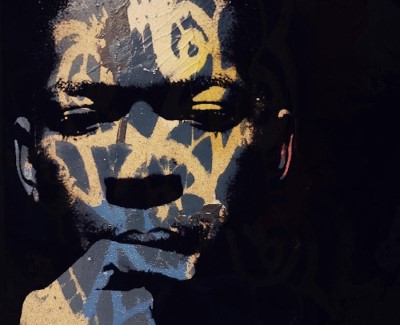
.
.
A Jazz Artist
He jazzed his way into the world
with wisps of hair
resonating to the tunes of his saxophone
and a simple dark attire
that had become the cult all over the globe.
His tan was as natural as Africa’s newborns,
the palms of his hands as white as the Alpine snow,
an Afro-American who was proud
of belonging to two continental homes.
His voice blended the mellifluous chords
which the jungle holds,
with an accent the Yankees had on him bestowed
a harmonious hoard,
an equilibrium between ancestral blood
and a heritage of Anglophones.
.
by Susie Gharib
.
___
.
If You Want To Play Jazz
If you want to play jazz,
If you want to play jazz,
You’ll have to learn notes, notes, notes.
That same simple scale, octave by octave, measure by measure,
If you want to play jazz.
But jazz is more than the notes. (Remember the soul).
Twelve little notes. A young child can play them.
But jazz is not notes, not twelve little notes, one after another.
(Remember the soul.)
Think of Bill Evans, “Like Someone in Love.”
You’ll hear what I mean.
Bill caresses the keys, makes love with the music.
Forget what I’m saying,
Just hear how he does it.
Those twelve little notes.
But give them to someone else, twelve little notes,
Say Coltrane or Monk,
Say Morgan or Getz, Lovano or Krall, there’s a change in the air.
That change is the jazz. (Remember the soul.)
Those twelve little notes.
Think of heart. Think of sorrow. Think joy.
Think of soul. (Remember the soul.)
It’s more than the notes.
Jazz is more than the notes.
Jazz can blow you away, blowing kisses to cowboys.
(Remember the soul.)
The twelve little notes…Those twelve little notes.
If you want to play jazz.
.
by Molly Larson Cook
.
___
.
Blueszia
the song they
be singing
up from alleys
damp from
last night
rises like
lazy morning
lifted with
heavy hands
wishing for
change coming
in beautiful
voices of
angel sounds
filling the
souls in
the name
of blueszia
.
by Roger Singer
.
___
.
Singin’ The Blues
I’m goin’ way back, here,
writin’ about Bix, Tram
and Eddie Lang—
[how does a writer insert
names like“Beiderbecke”
or “Trambauer ‘ into a poem?]—
but who plays it better
when it comes down to
“Singin’ the Blues?”
Tram’s cool sax solo
drifts lightly along
accompanied by
Eddie Lang’s
single-string picking,
beautiful and smooth,
hittin’ all the sweet spots.
Then, in comes Bix,
with a rhythm
that goes beyond
fillin’ all the spaces.
“Man,” someone says,
“it’s like touchin’
a live wire.”
Bix, Tram and Lang.
Three gods together.
Nothin’ but cooool!
Come on girl! Let’s dance!
.
by Russell duPont
.
___
.
Scott LaFaro
Standing On New Ground, 1961
crossing strings
within the known twos and fours being played
captive notes emerge
heard from fingers resolving
a pizzicato cohesion
his youth determined
by concepts redeemed
in a constant wonderland
of jade visions soothing foolish hearts
rooted in firm soil
bark, branch and bold leaf
upright in posture
a brief forest unto himself
no longer just a member adding
to the underlying rhythm
rather now a counter force to melody
consumed in the formation of a newer time
.
by Terrance Underwood
.
___
.
Woodshedding On The Williamsburg
……………To Sonny Rollins
Like a solitary monk
in a temple high
above the East River
making offerings
to your gods,
you wail to the sky,
sway with the wind,
honk with tugboats
to the rhythm of steel
wheels on steel tracks.
Listen! Take the A-Train
as the J-train takes the bridge.
.
by Brian Kates
.
.
Listen to the 1954 recording of pianist Oscar Peterson performing Harold Arlen’s “I’ve Got the World on a String,” with Ray Brown (bass); and Herb Ellis (drums). [Universal Music Group]
.
.
A Love Supreme In Four Movements
…………………………..With thanks to John Coltrane
Inside
Sunday morning
Daddy uses a cocktail shaker
to hide his trembling hands
Mixes their “eye opener”
rum milk ice nutmeg
Both of them
too hungover to drive
me to church
Outside
Wind
Wyoming wind that withers hope
blisters the prairie
blights thought
School
Wrung out women in Dominican habits
weaned of pleasure
weighed down by fathers
who knew their daughters
would never have suitors
Wardens of St. Mary’s
grade/high school
Reprieve
Winning the war against
the war in Vietnam
Conscientious objection
Alternative service 1970-72
Denver General Hospital
Bedpans the morgue,
death illness pain
and the cute psychiatric intern
who seduced me a lowly
hospital attendant,
in the med room
the sanctum sanctorum
of the Psych Ward
We marry atop a mountain
in Gold Hill, Co. 1974
A love supreme
Fifty years and counting
.
by Charlie Brice
.
___
.
His Albums
Listening through his ears
I hear saxes, bones, harmonicas,
Trumpets trill, low bass, deep
baritones and ivories twinkle.
His collection brings pieces of
him back to me. Moments of
his satisfied smile
his smoky voice
his arms encircling me.
Moments of pure bliss.
.
by Linda Freudenberger
.
___
.
One Dream, One Love
Lonely souls built for this
A life that is improvisational,
Hardwired to receive every whispered
Oath: “My heart is a virtuoso…”
Fingers as nimble as those of Oscar
Peterson. They glitter, but they can’t
Hold on to what is important; our
Interwoven fingers play the Blues
On every single key
“And just because it hurts
Doesn’t mean it’s not beautiful”
Poetry is our soul’s only swagger,
Skimming the daunting plot of all
Existence. The nasty habit of smoked
Cigarettes, the jewels Americana of
A NOLA accent, I know you don’t
Speak like that to just anyone
Improvisational
A glimpse at what resembled
Paradise and what we want most
Is beyond our grasp. The one, the only
One in a life that feels lost, purely
Improvisational, as Oscar Peterson
Caresses the keys and agrees:
“this nearly was mine”
.
by Connie Johnson
.
___
.
Dear Old Stockholm
Four-year girl,
quiet and steady.
But she lived in Tulsa
and I hated Tulsa.
Then you came
with your fancy blue,
drowsy fish eyes
and red leather shoes.
Now you’re with your art friends,
photo friends going on
SoHo bends, sipping on
alcohol trends.
Forgot about Flamenco Sketches
and midnight dresses and
when you lost tea through your nose
because I thought Helsinki was in the Mediterranean.
Dear Old Stockholm
you knew me too,
just another boy in the dark
makes the rain slant, go skew.
.
by Michael Edman
.
___
.
Another Day
The day we said goodbye Yoko Miwa
sat down at her piano.
Sometimes crying is the easiest thing to do.
Happiness is always improvisation.
The night begins on-and-off-beat notes.
There is so much silence we never hear about
in relationships.
There are questions we don’t know how to ask.
In our solitude we write to one another.
We listen to Billie Holiday singing alone
another day.
.
by Miho Kinnas and E. Ethelbert Miller
.
___
.
Morning Jazz
She comes out like
The flowers, the Worker
Bee, arrives with Summer
Like a Monk piano riff, and
She is its champion, like
Ella Fitzgerald, she moves like
Ella scat sings, she swings her
Life, effortlessly, her life is effortless
She bends her body in the sunshine
As Ornette Coleman, bends notes
And removes logic from jazz, but
Like jazz, she is not about logic
But about feeling, she is the keys
On a Steinway, as she lays across it
Like the Mona Lisa, she is a work of
Art, flashing a smile that could bring
Down armies, she dances like Esther
To the morning songs, that give her
A heartbeat, a groove you want to savor
Again and again…
.
by Erren Kelly
.
.
“Thelonious Monk”/© Paul Lovering
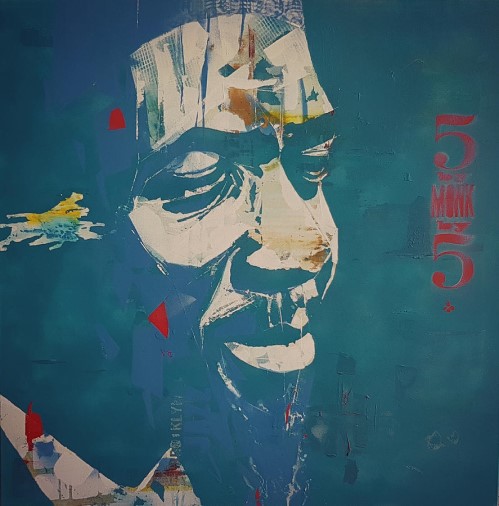
.
.
graffiti (inspired by characters on a wall, louis sclavis quartet)
satie & dolphy:
different wings,
the same joint
(walls that hold
our breath
from
us) –
to open the
air of this
prison,
the
solo
self
dreams
in groups
*
paris ’68, tideline-on-brick:
sous les paves, la plage
(under the paving, the
beach) – palestine
sand paintings,
olive groves
spray-
ed
.
by Sean Howard
.
___
.
Rainy Jazz
Leo Touchet the photographer and his wife Liz the poet stop by
…………to see me on their way down from New York
……………………..to Breaux Bridge, Louisiana. We meet in Waffle House
…………by Highway 82 in Greenwood to discuss his photo exhibit
on our campus next month: 25 black and white photographs
…………of jazz funerals taken in New Orleans between 1968 and 1970.
……………………..Leo says that the funeral procession is called First Line—
…………a communion of souls sad with slow hymns and dirges, but
the jazz parade after the funeral is called Second Line—
…………a celebration of a new life with a mood switch. Revelers
……………………..hold umbrellas, wave handkerchiefs, and shake bodies
…………to lively music for a cathartic release of emotions.
That’s the climax of the parade. A sudden crack of lightning.
…………We look out. The sky revels in its music: booming thunder,
……………………..rattling rain, and flashing and cracking lightning,
…………like a jazz parade to celebrate the coming of spring.
Like spectators, we keep chatting about Second Line
…………while savoring our brunches: waffles, bacon, biscuits,
……………………..hash browns, sausage patties, and sunny-side-up eggs.
…………My goodness! We utter our surprise. The roof begins to leak.
Water seeps through the ceiling and spits soybean-size drops
…………on napkins and plates as if to punch holes in our chat.
……………………..We run out. On the road to campus, our cars
…………snail through blinding rain like revelers jazzing with verve.
.
by Jianqing Zheng
.
___
.
On Sun Ra And His Arkestra
swing ca-ching play that thing
whatever it is loose free and wild
quiet mellow loud chaotic all sound
is meant to diddley-bop-she-bop
cut divots in the floor from wild dance
no limits no holding back all is fair free
dangerously daring swinging singing
music is summation of life in all its forms
you must be alive to embrace this freeform
perilous jumping juking disorderly wicked jive
whispers or shouts caresses or blows all
can be encountered in this sonic landscape
.
by Michael L. Newell
.
___
.
Jagged Rhythm Fat
ndijinus soul spins to the two-step beat
around the powwow ground
a quick soft toe twirl
on deer hide moccasins
swaying slim hips
in hypnotic rhythm
silver jingles swinging
like the ripple of blue ocean
urbn soul spins to her modern pop
around the party floor
purple painted toes jigging
against the downbeat
twerking heavy hips
in reckless rhythm
gold bangles jangling
like gypsy music
both dancing a Changing Woman’s waltz
one’s interpretation fine embroidery
the other interprets a crazy patchwork quilt
urbn soul brings the pulse
of the hand drum into her world
adds half steps
turns it into the latest craze
ndijinus keeps the natural harmony
of the raw hide hand drum
but introduces a red robin on the spin
an arabesque
one dances the artist’s brush on canvas
the other graffiti on concrete
urbn up stream
indijinus with the current
one throwing in some jagged rhythm
with a smooth fat melody
the other weaving in satin soul
with rock and roll
they dance the stars and moon
they both dance a compliment
to Changing Woman
.
by Norla Chee
.
.
Listen to the 1957 recording of Miles Davis playing the Ray Henderson/Mort Dixon composition “Bye Bye Blackbird,” with John Coltrane (tenor saxophone); Red Garland (piano); Paul Chambers (bass); and Philly Joe Jones (drums). [Columbia/Legacy]
.
.
Hourglass
I awake to the susurration of the vinyl,
The needle ebbing back and forth,
Like remnants washing upon the
Shores of consciousness.
It’s 4am
Like it always has been,
Out of time
As the music satisfies my mood
Listening to a sand glass
As it separates my thoughts
Sifting
Until I’m feeling on top
Of everything that was once on top of me.
.
by Anthony Ward
.
___
.
The Jazz Band
Rhythm,
the energy propelling sound,
a pulse that initiates excitement
as your soul begins to bounce,
your legs begin to sway
until syncopation diverts that beat
and opens an even more lively,
more complicated path
for the music to follow,
the musicians feverishly intense,
intent on stealing your psyche
to mesh with their passion,
as their rapture controls your drift
toward a state of immersion
with developing melodic lines,
complex harmonic structures
and intense instrumental timbres
to grip your presence,
and you drift
with this ensemble toward a realm
which later will be inexplicable
as you relive and attempt
to reconstruct the joy
you experienced,
lines of jazz amassed with
the creative spirit of artists,
the jazz ensemble
revealing its essence
to bind with your own
and for a moment this night,
you will be understood.
.
by Michael Keshigian
.
___
.
Reviving The Dance
Chords and scales crowd out
the past in a neon red and jazz-
filled bar. The day was
autumn grey, but now the night
is sparking with electric hope
and expectation counted in
at bebop time.
Finding the rhythm again
in a synthesised trance
we lose ourselves
in steps and echoes
of an improvised dance.
Tomorrow
we’ll face the day together
stepping out into the street
with the buskers and the beggars
and the Big Issue sellers
as our feet hit the sidewalk
with a syncopated beat
now we’ve found again the rhythm,
and our dancing is complete.
.
by Adrian Green
.
___
.
Discordant
Bye, bye, blackbird
Where somebody waits for me
Sugar’s sweet, so is she
Bye, bye, blackbird
– Mort Dixon (1926)
Tables tumble, chairs crash, but John
the bassist stands tall without losing
a beat, while Marty’s sticks remain
suspended in the air for a fraction
of a second before he catches up
with a half-time-and-double move
that blows even me away along
with my bleak notions about
what is happening in the back and
whether she’ll be safe or whether
that techno DJ will make off with her
and then send a spotty ransom note
for a sum I’ve been redeeming longer
than his years, or so it seems,
and at this stage can hardly meet,
given the pittance we play for,
not to mention the sparsity of our gigs,
which as band leader I have to put
together somehow, just like it’s up
to me right now to rekindle the spirit
of this piece – Coltrane’s Bye Bye
Blackbird – resuscitate its soul, give it
flight, a soaring lightness, and move
the splinters and chunks of wood
and sorrow and all the constituent
parts back into their original shapes
and destinies within this dark, lonely,
reverent universe where insurgencies
manifest themselves strictly
in four-four time and the barbs in
your heart covertly grow into brittle
formless wildflowers.
.
by Francis Fernandes
.
___
.
Rock Step Away
………….From “Hell” by Squirrel Nut Zippers
Even before the deep voice began, In the afterlife…
the bouncy doom of the horns
made me think I could dance.
Triple step, triple step, rock step away.
Away and back, close and far.
Roll in for a twirl and back to bend.
Did he dare to lift?
Could we pretzel together
before slithering apart?
Fingertips glide, bare shoulder to hand:
a shivery journey in a storm of music.
Triple step, triple step, rock step away.
This dance demanded skirts that swirled
and lit my imagination with the past.
It shook out dresses and petticoats
in my grandma’s closets.
It gave her black velvet
a second chance to jitterbug and boogie.
Triple step, triple step, rock step away.
In the dim school cafeteria
trimmed with twinkle lights,
my feet felt heavy and huge.
They did not know which way to go:
the beat hustled them along.
My arms mutated into big branches
dangling at my sides.
The triple step, triple step, rock step away
freed me from the need to improvise
and follow scripts
no one shared with me.
Even now, I remind myself
to watch the cues,
to follow the steps,
to remember when to step in
and when to step back.
Triple step, triple step, rock step away.
My daughters twirl in.
My daughters twirl out.
I hold them close in the kitchen
and release their hands
for any life they choose.
Triple step, triple step,
rock step away.
.
by Liona T. Burnham
.
.
“Blue Moon”(Billie Holiday)/© Paul Lovering

.
.
Stompin’ At The Savoy
Sheets of music laid across a checkered table cloth
spread out like streets across the city.
Like the quarter notes on page one, a crescent moon
is seen rising in the ink dark sky.
Outside the open window an art deco neon Jazz sign,
like on Broadway, and beyond—
the polka dots of lighted windows in high rises
are dominoes climbing the evening’s high tide.
Stars sparkle like salt against dark skin.
Who’ll swing from the moon this night?
Who’ll blast his sax until sunrise?
Who’ll be stumbling in the heart of night?
And who will be stompin’ at the Savoy,
walking bass, talking drums, making us more alive!
.
by DH Jenkins
.
___
.
somewhere near the major-minor seventh
…………………for Anita
cohen says there are major falls
and minor lifts that come before
the fourths and fifths and i suppose
he’s probably right, most likely right
but this is not about some hallelujah
this is a dim-lit club where jazz goes down
where the drummer’s beat is something
i could never, ever dance to, but then
there’s no need for dancing, romancing
when your hand brushes mine quite accidently
and you see my eyes go oh, so slightly wider
at the exact second the sax begins to climb
higher than he ought to fly before he comes
back down, he comes back down, and so do i
which leaves you with the question
was it your touch or the music
you or the jazz
the answer, if there is a simple one
is hidden in the six-seven syncopation
the ivory’s seamless modulation
saxophone’s seductive deep vibration
past the seconds, sixths and on to
a lingering, unresolved emotion
somewhere near the major-minor seventh
that leaves me so much room to get to know you
………….previously appeared in april with friends – vol i (self-published chapbook, April 2021)
.
by Jim Lewis
.
___
.
Roy Haynes, Drummer
In his 90s, he has more energy than ‘cats
half his age, he doesn’t lightly hit the drums
he bangs a tribal call to the gods
Cher is his equivalent at 76, dating a guy
thirty six years younger, giving a finger to the
status quo; or a 72-year-old woman
who’s a fitness trainer, whose body
won’t act her age
Roy bangs the skins like Tom Brady
Threw Touchdown passes in his 40
Telling Father Time “Not Yet.”
Or Paulina Porizkova, a supermodel
taking nude selfies at 58, refusing to accept
getting older
Roy gets on stage, not thinking of it
as his cage, but as his jungle and
jazz becomes his toy, as Madonna dances
with her Toy Boy’s; Roy gets into his groove
and Father Time just taps along with the beat
knowing, Roy ain’t ready for him, ever
.
by Erren Kelly
.
___
.
Power Of Rhythm
Let us begin by noting
drums ensnared by sticks
in hands of Buddy Rich;
flicks of his wrists generate
rhythmic melodies that lift
bodies to feet that create
dances unknown prior
to encountering the magic
in Rich’s rich assortment
of rhythms leading listeners
to tap, bounce, swirl, twirl,
discover how bodies can
express life’s manifold rhythms.
.
by Michael L. Newell
.
___
.
A Half-Golden-Inch
I learned to drink Scotch
in a dark lounge in New York City —
a booth,
a trio crowded in the shadows
at the foot of the long bar,
the mirror behind casting tawny light,
a half-golden-inch,
squat glass,
no ice,
horn softly tossing cursive notes into the air,
feathered drumming,
fingers tracing the echo of ivories on the wooden table,
the sax mourning
the miles
between
us.
,
by Kathryn MacDonald
.
___
.
Truth Or Dare
An unnamed actor loved jazz, played clarinet
in a small club, New York City, mid-town. Darkness
descended, spilling like wet oil on each table.
What we heard: musical notes stretching
across the floor, embracing us with sound,
like a lover man “where have you been”
come home.
What we didn’t hear: secrets beyond the bounds
of imagination. Small girl available for taking,
legitimized by marriage years later.
Truth or dare; which?
.
by Judith Vaughn
.
.
Listen to the 1959 recording of John Coltrane playing “I’ll Wait and Pray,” with Wynton Kelly (piano); Paul Chambers (bass); and Jimmy Cobb (drums). [Rhino/Atlantic]
.
.
Riding The Blue Train
Riding the Blue Train,
back to back tracks
on drive in, blowing from work,
what worked and what didn’t,
reading poems, through the tunnel,
no signal, hand writing lines on receipts,
while on the Train, looking out the window
at withers and browns,
taking this bridge to the urgency of children
all solos, like the way,
Coltrane trades with Morgan,
stretches, unresolved,
getting onto the next track,
the theme expanding,
the same stops, on different days,
everything, every solo, evolving
impact tying it together,
what works, all of the abstraction,
(all the counterfeit selfishness hanging what’s right)
like the whitening temples
of the Mississippi shoreline in January.
.
by Michel Krug
.
___
.
John’s Journey
From a hamlet
Baptized in sound
Alto, tenor,
Soprano sax
Studied, practiced
Perfected riffs transcending
Addictions pressed
Supreme love quest
Improv notes, life’s cascade
Free jazz redemption
Universal truths conveyed
Sainthood
Trane ride
A life
Still played
.
by Mike Mignano
.
___
.
The Healing Properties Of Kind of Blue
Upon hitting play,
the melodies start to say
melodic, medicinal things
to me. Repeatedly, Kind
Of Blue is mastery, is
moments in time trapping
medicines in music. I use
it to slow me down, stop
the world’s madness
from overcoming me,
use its melodies
like tea when I find myself
getting sick. Quickly, its
tones hit my mind, my
spine, my spirit. A gift.
Out of me it sifts the
germs gathering in
my body. One by one
those germs begin to
let go. Kind Of Blue is
Its own kind of voodoo.
Stew for stamina. Calm
for a moving mind. Divine
in times of illness, wicked
wonders from the realms
of rotten toxins. When I have
forgotten Kind Of Blue is
medicinal, my fingers get
physical, finding the play
button. I zone in. I welcome
the ease, the peace it brings.
Miles sings through his trumpet.
I am transformed, reborn. I let
it do what it do. Healing me,
Kind Of Blue. Healing me,
Kind Of Blue.
.
by Christopher D. Sims
.
___
.
Goodbye Pork Pie Hat
four words provide
an ultimate pithy salute
to a mistreated genius
gone too soon as was
the composer of this tune
two lost too soon for all
the wrong reasons
in a time where genius
blessed listeners
but the world did not
care and we lost more
than we dared admit
to ourselves
two who made music
that reached deep
into the mind heart
and soul baby soul
and then were gone
many many years
too damn soon
Lester and Mingus
bless you wherever
you are and goddamn
a cruel unfeeling world
good bye
pork pie hat
and the man who
composed the salute
which tied you two
together for decades
listening to the tune
I weep and rejoice
and wonder when
or if ever
anything will change
.
by Michael L. Newell
.
___
.
Dirge
In the latest deluge of my tears,
stuck in Five Eyes,
amidst the Internet of Things and their keepers,
emerging aliens from the outer colonizing inner space,
rightwing parasitic reactionaries, rising in miasma,
I slap at African drums to know again
the heartbeat I forgot.
A squeezebox brings a slow gypsy air
and a violin rasps, horse hair wisp-ers,
like the last suspirations of a soul leaving its body.
I see the frozen tundra of the world
in thaw, releasing the evil we left behind,
in darker ages, before magna carta,
newly emerging with rusty cackles
and cock-of-the-walk smirks
angels of the Anglosphere
pure Mighty Whitey
that have you believing
that the exiled Cain
has returned.
What am I supposed to do?
It’s too late for lamentations
or gnashing of teeth
or pretending I have the energy
of Billy Cobham at work.
I’m beaten down.
My tin kazoo
plays taps
.
by John Kendall Hawkins
.
___
.
Jazz Obituary
The biographer assumes
You may keenly agree
With many quoted here who say
They had singular misfortune
Ever to know him
He was a flawed and sordid
Deeply unlovely person
Though. –.now I consider –
All such critics seem to be
American by nation and persuasion
Possessing inalienable right
In assumption of moral outrage
That addiction is not progressive
Illness but expression of malign
Maladjusted degenerate character –
Needless to say I disagree
Being un-melodramatically English
And his music I say is the sound
Of a stillness that defines
The dandy’s unsung attribute –
Discretion
.
by Bernard Saint
.
___
.
If Requests Are Being Taken
If ever
I am subjected to
Further medical exploration
& something
Identified as Bio
Is discovered
Pop any shared opsy to
Record whether
A Strange Meadow Lark
Flies away on
Time Out
Brubeck & Desmond feathers
………………………..If so
Let the music fade
& note the smile
.
by Terrance Underwood
.
.
_____
.
.
Click here to read the artist and poet biographies
.
.
___
.
.
Click here to read The Sunday Poem
Click here to read “A Collection of Jazz Poetry – Winter, 2024 Edition”
Click here to read “Ballad,” Lúcia Leão’s winning story in the 65th Jerry Jazz Musician Short Fiction Contest
Click here for information about how to submit your poetry or short fiction
Click here to subscribe to the (free) Jerry Jazz Musician quarterly newsletter
Click here to help support the ongoing publication of Jerry Jazz Musician, and to keep it commercial-free (thank you!)
.
___
.
.
Jerry Jazz Musician…human produced (and AI-free) since 1999
.
.
.









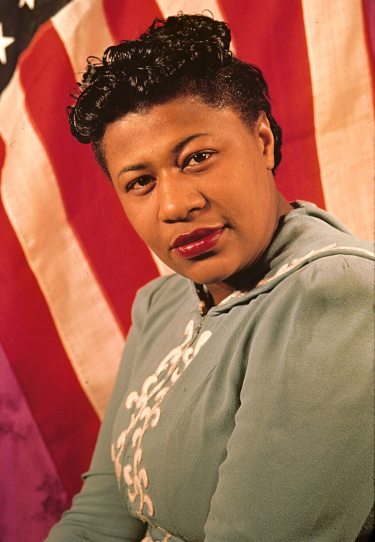















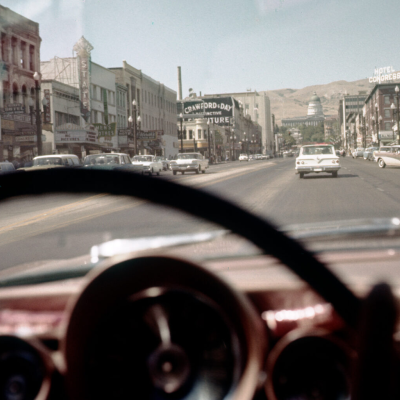















I have read a few poems in this collection, and they are all stellar pieces of poetry. The language of each poem is engaging. There is nothing like jazz-focused poetry. I am thankful to have a poem featured in this collection,
As always, this is an intriguing collection. I look forward to spending more time reading, again & again. Then, looking up all the music in the poems. Congratulations to Joe Maita and all the contributors. All the best, Leah Ann Sullivan